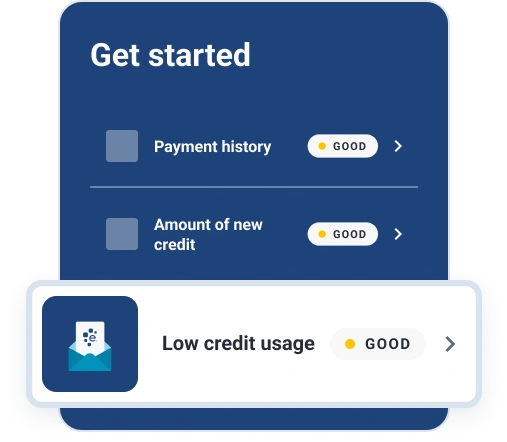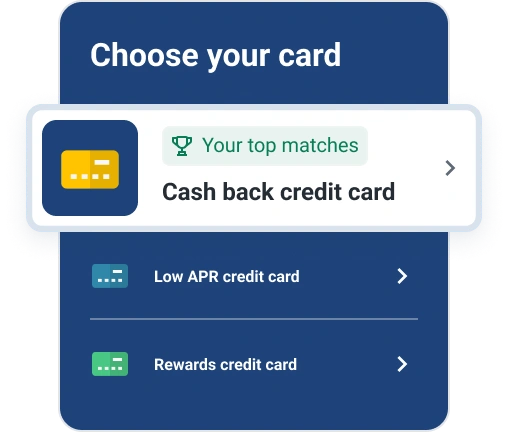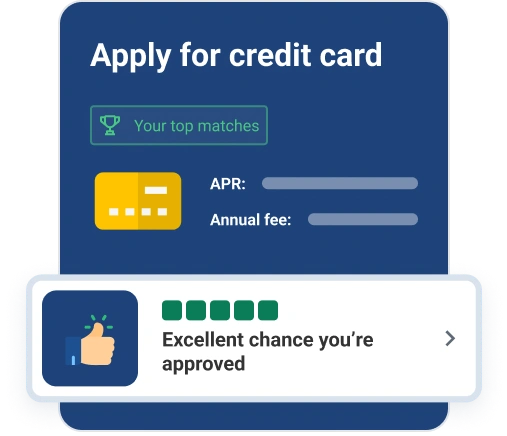At Experian, one of our priorities is consumer credit and finance education. This post may contain links and references to one or more of our partners, but we provide an objective view to help you make the best decisions. For more information, see our Editorial Policy.
In this article:
With thousands of options to choose between, picking a credit card can be a challenge. Ultimately, the best credit card to get comes down to the type of card you want, your spending habits and your credit.
Here's what you need to know about the different credit card options that are available to help you narrow down your list, plus how to determine the right fit for you.
What Is the Best Credit Card to Get?
There's no single best credit card out there for everyone, but some credit cards have more benefits than others. Each card has its own set of features, fees and other terms, some of which will be a better fit for you than others based on your preferences, spending habits and credit.
The first step in the process of choosing a credit card is to learn about the different options in front of you and how each one could work for you.
Types of Credit Cards
There are several types of credit cards from which you can choose. Regardless of which card you have in mind, make sure you meet its credit requirements and that its features work well with your lifestyle.
Here are common types of credit cards:
- Rewards credit cards
- Balance transfer credit cards
- Intro 0% APR credit cards
- Student credit cards
- Secured credit cards
- Store credit cards
Rewards Credit Cards
How a rewards card works: Rewards credit cards offer cash back, points or miles on your everyday spending, and often also a welcome bonus.
Depending on which card you choose, you may earn a flat rewards rate on everything, a tiered rewards structure with bonus rewards on certain spending categories or rotating rewards with different bonus categories throughout the year.
Cash back credit cards often don't charge an annual fee and may also offer an introductory 0% APR promotion, but they typically don't offer a lot of perks. In contrast, travel credit cards are more likely to charge annual fees, but they may also offer various benefits, such as travel credits, airport lounge access, perks with your favorite airline or hotel brand and more.
Who a rewards card is best for: Consider a rewards credit card if you want to make the most of your everyday spending and can afford to pay your bill in full every month.
As you compare rewards credit cards, try to find one with a rewards structure that aligns well with your spending habits. Also, look for other features you want, and if a card charges an annual fee, make sure the benefits are worth it.
What credit score you need: The best rewards credit cards typically require good or excellent credit—meaning a FICO® Score☉ Θ and Experian credit report and Experian credit report and Experian credit report and Experian credit report and Experian credit report of 670 or higher. However, there are also rewards cards available to borrowers with fair or even poor credit scores.
Learn more: How to Choose a Rewards Credit Card
Earn rewards for your spending
Balance Transfer Credit Cards
How a balance transfer card works: Balance transfer credit cards allow you to move debt from one or more other credit cards via a balance transfer and pay off the balance with a 0% introductory APR for 12 to 21 months, depending on the card.
This arrangement isn't always completely free, though. Many balance transfer credit cards charge an upfront fee—typically 3% to 5% of the transfer amount—to process the transaction. Depending on how much debt you have and how much you stand to gain in interest savings, however, it could be well worth it to pay the fee.
In many cases, balance transfer credit cards also offer rewards, providing you with long-term value after the promotional 0% APR period expires.
Who a balance transfer card is best for: A balance transfer card is an excellent fit for someone who has high-interest debt on another credit card, wants to save money on interest with a 0% intro APR promotion and won't be tempted to run up balances on the paid-off cards.
As you compare balance transfer cards, pay special attention to the length of the promotional period, along with other features that are important to you.
What credit score you need: Generally speaking, you'll need good or excellent credit to get approved for a balance transfer card. However, there may be some options available to fair-credit borrowers.
Learn more: Pros and Cons of Balance Transfer Cards
0% Intro APR Credit Cards
How a 0% intro APR card works: Also called low-interest credit cards, these cards typically offer an introductory 0% APR promotion, during which you'll pay no interest on purchases for a set period—typically between 12 and 21 months.
This promotion gives you time to make a large purchase or several purchases and pay them off over time interest-free. As long as you pay the balance in full by the end of the promotional period, you won't pay any interest. However, if you have a remaining balance by the time the promotional period is over, your leftover balance will be assessed interest based on the card's standard APR.
These cards may also provide rewards, welcome offers and other valuable benefits.
Who a 0% intro APR card is best for: A 0% intro APR credit card is perfect for people who have one or more large expenses coming up and can't afford to pay them off quickly.
For example, you could use one for wedding expenses, moving costs, medical bills, minor home renovations or repairs or even emergency expenses.
When comparing 0% intro APR credit cards, focus on the length of the promotional period, along with the rewards rates, welcome bonus and other features you want in a card.
What credit score you need: You'll typically need good or excellent credit to get a card with a 0% APR promotion. That said, some student credit cards offer this benefit without requiring a credit history at all.
Learn more: What You Need to Know About 0% APR Credit Card Offers
Student Credit Cards
How a student card works: If you're a college student, you may be able to qualify for a student credit card. These cards don't require a security deposit and often come with perks that can help you establish good credit habits.
Who a student card is best for: Student credit cards are specifically designed for college students, and many won't approve your application if you're not actively attending school or planning on it.
As you shop around for a student credit card, look at the credit score requirements, rewards rates and other perks.
What credit score you need: Credit requirements can vary by card, with some requiring at least some credit history and others no credit history at all.
Learn more: How to Build Credit as a College Student
Secured Credit Cards
How a secured card works: These credit cards work almost exactly like traditional credit cards, with just one distinction: Secured credit cards require that you put up a security deposit—often equal to your approved credit limit—to get approved.
That means that if you're willing to put down $200, you can typically get just a $200 credit limit. As you use the card and make payments, the card issuer will report the activity to the credit bureaus. Make sure any card you're considering reports to all three credit bureaus (Experian, TransUnion and Equifax).
The best secured credit cards don't charge an annual fee, but they tend to have higher interest rates. In some cases, you may be able to earn rewards while you work on building your credit.
Who a secured card is best for: Secured credit cards are specifically designed for people with poor credit, a limited credit history or no credit at all.
So, consider applying for one if you need some help building or rebuilding your credit history.
What credit score you need: You can typically get approved for a secured credit card with poor credit or no credit history at all.
Learn more: How to Use a Secured Credit Card
Store Credit Cards
How a store card works: Store credit cards are offered by many retailers and often will net you rewards or perks when you shop at the store that issued them. You may even get a one-time discount when you apply for the card or get approved.
Closed-loop store credit cards can only be used with the co-branded retailer, while open-loop retail cards allow you to make purchases just about anywhere.
Some store credit cards can be accessible even if your credit isn't in great shape. However, they typically charge higher interest rates and have lower credit limits than traditional rewards credit cards.
Who a store card is best for: You could consider a store credit card if you spend a lot of money with a particular retailer and want to enjoy extra rewards, discounts and other perks when you shop there.
Alternatively, a store credit card could be worth a look if your credit is less than stellar and you want to avoid a secured credit card.
What credit score you need: Closed-loop store credit cards may be accessible to people with poor or fair credit. However, open-loop cards may have more stringent eligibility criteria, requiring good or excellent credit in some cases.
Learn more: Pros and Cons of Store Credit Cards
How to Choose a Credit Card
To ensure you find the right credit card for you, here are some steps you can follow:
- Check your credit score. Knowing where your credit health stands can give you a good idea of which types of cards you can get. If you have great credit, for instance, you may have your pick of the best options. But if your score is relatively low, your selection may be limited. Register with Experian to get free access to your FICO® Score and Experian credit report.
- Look at your spending habits. Take a look at your expenses over the past few months to get an idea of where you spend most of your money. Then, consider a card with a rewards rate that aligns well with your spending to make the most of your everyday purchases.
- Consider other preferences. Shopping around for credit cards can give you a general idea of what features you can get. Once you've gathered some information about what's available, determine which features are most appealing to you. At the same time, make sure you'd get enough value from a card to offset its annual fee.
- Choose a card and apply. Take your time to shop around to find the card that provides the features and benefits you're looking for. Then, apply online by providing basic information about yourself. You'll typically get a decision within seconds of submitting the application.
Learn more: How to Get Approved for a Credit Card
Compare top credit cards matched for you
What to Know When Choosing a Credit Card for the First Time
If you're applying for your first credit card, there are some important features you'll want to be aware of. Here are a handful of tips to help you develop good credit card habits:
- Most credit cards offer a grace period. A credit card grace period is the stretch of time between your statement date and payment due date—it lasts a minimum of 21 days. If you pay your monthly bill in full during this time, you won't pay any interest on your purchases from the previous month. That said, you can lose your grace period if you don't pay in full.
- Late payments can hurt your credit. If you miss a payment by a single day, you'll be charged interest and often a late fee. However, if your bill remains unpaid for 30 days, the card issuer may report it to the credit bureaus, which can cause significant damage to your credit score.
- It's best to maintain a low balance. Your credit utilization rate represents the percentage of available credit you're using at a given time, and it's a major factor in your FICO® Score. Credit experts often recommend keeping your utilization rate below 30%, but the lower it is, the better.
- Credit cards are complex. Before you apply for a credit card, it's crucial to review the terms and conditions, including interest rates, fees and other features, to ensure you understand what you're getting.
- Too many credit card applications can hurt your credit. Each time you apply for a credit card, the issuer will typically run a hard inquiry on one or more of your credit reports. A single inquiry won't do much damage, but if you apply for multiple cards in a short period of time, it can have a compounding effect. A good rule of thumb is to space out your credit applications by at least six months.
- You can earn rewards and a welcome bonus. Many credit cards offer rewards programs that allow you to earn cash back, points or miles on all eligible spending. Plus these cards often have introductory welcome bonus offers that allow you to earn rewards after you spend a certain amount in a given timeframe. Just keep in mind that you shouldn't overspend just to earn rewards—it's not worth it.
Learn more: How to Use a Credit Card Responsibly
What to Do if Your Credit Card Application Is Denied
If you apply for a credit card and your application is denied, the card issuer will send you what's called an adverse action letter detailing the reasons for the denial. Here are some steps you can take to minimize the chances of getting declined again in the future:
- Carefully review the adverse action letter. The first step is to understand why you were denied. You should receive the notice within 30 days.
- Review your credit reports. This will help you determine which areas need some work. Also, if you find negative information that's inaccurate, you have the right to file a dispute with the credit reporting agencies.
- Ask the card issuer to reconsider. In some cases, you may be able to get the denial overturned. For example, maybe you forgot to include an income source, or you're willing to move some available credit you have on another card with the same issuer to the new account. Whatever the reason, reach out to the card issuer to find out if there's a way to plead your case.
- Improve your approval odds. Depending on what you find in your adverse action notice and credit reports, take steps to bolster your creditworthiness. This may include paying down credit card balances, eliminating other debts or even becoming an authorized user on a loved one's credit card.
- Apply for a more suitable card. If you've determined that your credit score was too low to qualify for the card, consider getting matched with credit cards based on your credit profile.
Learn more: How Long to Wait Between Credit Card Applications
Frequently Asked Questions
What Is a Good APR for a Credit Card?
Generally speaking, a good credit card interest rate is one that's below the national average. However, if you have a less-than-stellar credit score, you can expect a higher APR.
At any rate, it's crucial to minimize spending on a credit card unless you can afford to pay off the balance in full every month and avoid interest charges entirely.
Is an Annual Fee Worth It?
Many credit cards charge annual fees, which are usually under $100, but in some cases, they can be hundreds of dollars a year.
Depending on the card's benefits and how you use them, however, paying an annual fee can be worthwhile. To evaluate whether the cost of a credit card is worth it for you, estimate how much value you can get from the card's benefits and rewards and subtract the annual fee. Then, run the same numbers for other cards you're considering to determine which one will give you the most effective value every year.
How to Use a Credit Card
Credit cards can be a convenient and valuable way to make everyday purchases. However, it's critical that you learn and follow best practices to enjoy your card's benefits without the risk of high-interest debt. Here are some to keep in mind:
- Maintain a budget. Credit cards can make it easy to overspend. If you don't already have a budget, consider creating one to ensure that you always spend less than you earn.
- Pay on time and in full. Paying your monthly bill on time and in full can help you not only build credit but also avoid interest charges along the way.
- Keep your balance low. A low credit utilization rate can help you build and maintain a good credit score and also avoid taking on more debt than you can afford to repay.
- Monitor your credit. Monitoring your credit can help you better understand how your actions impact your credit score and also make it easier to address potential problems as they arise. With Experian's free credit monitoring service, you'll get access to your FICO® Score and Experian credit report, along with real-time alerts with updates to your credit report.
Choose the Best Card for Right Now
You may want to spend extra time to pick the best credit card for the long term, but chances are that your credit score, spending habits and preferences will all change over time. Additionally, it's possible that you may miss a great card in your research that you might want later.
As such, it's a good idea to evaluate your situation every year or two to determine if you're still using the best credit card for you.
Rather than trying to predict the future or analyze every single credit card you can find, focus on which card is best for you right now and leave the door open for new and potentially better credit cards in the future.




